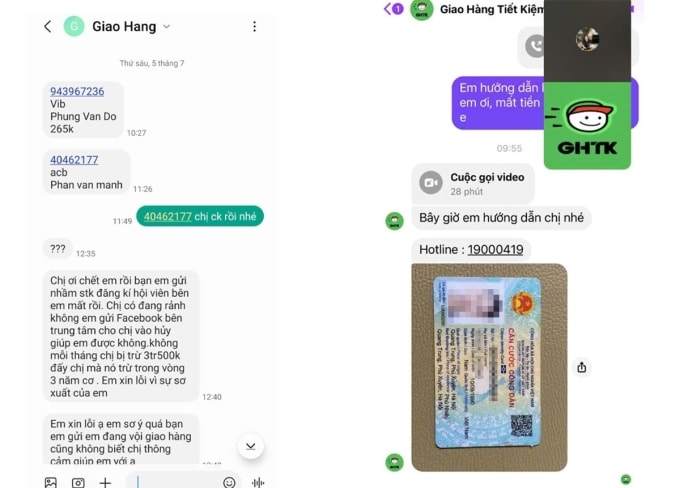Pretending to be a shipper "sending goods to the old place" to trick buyers into transferring money
After transferring payment for the purchase to the "fake shipper", Ms. Hoa continued to be "enticement" and psychologically manipulated by them, and then had nearly 100 million VND withdrawn from her credit card.

For the past four months, whenever she thinks about her story, Ms. Hoa, who lives in Hanoi, always starts with the phrase "unimaginable, hard to believe but true". "Although I have been very cautious about the ever-evolving online scams over the years, I have still been lured by them, hitting right into my human nature", she said.
One day in early June, Ms. Hoa was working at the office when she received a call from an unknown number informing her of an order worth 267,000 VND. Coincidentally, a few days earlier, she had ordered an item on an e-commerce platform with the same price of 267,000 VND, so she thought this was a "real shipper".
As usual, she told the delivery staff to leave the items at the building's reception and then texted the account number to transfer the money. With this order, half an hour after transferring the money, she saw the shipper text: "Oh no, my friend sent the wrong account number for the membership registration, so can you please go to Facebook to cancel it for me? Otherwise, I will be deducted 3.5 million VND every month for 3 years. I apologize to you for my carelessness."
Immediately after that, this person called to explain, but Ms. Hoa refused to follow the request, saying that it was the delivery person's fault and that she did not want to be bothered. "However, the other person cried and said that if I did not help him, he would lose a month's salary. A while later, another person called and said that he was the shipper's friend and apologized for sending the wrong account number. Both of them claimed to be students and spoke in a very pitiful voice, so I agreed to help," Ms. Hoa said.
The "delivery man" then sent her a link to access, contact the call center to cancel the transaction, and receive a refund. Accessing the link, Ms. Hoa saw a chat on Facebook with the name Giaohangtietkiem, so she texted to ask for instructions on how to cancel the transaction.
The story starts to get "twisted" from here. The first person, after a while of calling to give instructions, could not cancel the transaction so he introduced the "team leader". When following the instructions of this "team leader", the bank account was suspended because the biometrics were not registered.
This group asked her to use another bank account to guide her on how to cancel her membership so she could get her 267,000 VND back. At this point, Hoa felt it was a waste of time, so she told them to cancel it for her and that they would not take the money back. However, they said that if she did not cancel, "the poor student who delivers goods will be deducted 3.5 million VND per month."
Ms. Hoa said she felt sorry for him so she said she had a Sacombank visa card and asked, "Can you give it to me?" The video call via Facebook was still going on but the camera on the other end was turned off. Following the instructions, Ms. Hoa took a photo of both sides of the visa card and sent it to perform the operations.
At that time, there were noises on the other side like a bank transaction, which distracted her. A few minutes later, the phone showed a message with an OTP code, so she was stunned and quickly hung up the call. At the same time, she received a notification that she had withdrawn money three times via visa card, totaling nearly 100 million VND.
Ms. Hoa called back, the scammer still answered and replied "temporarily withdraw to complete the procedure, will transfer back later". "I suddenly realized, knew I had been scammed so I called the bank to block the card", she said.
Even though the scammers got the money, they did not stop. The next afternoon, they called again and asked her to do more operations on her bank account to get her money back, but Ms. Hoa refused.
"After this incident, I hope people will be more vigilant against tricks that exploit people's feelings of compassion. I advise not to follow strangers' advice or you will end up like me," said Ms. Hoa.

"Impersonating a fraudulent shipper" is a phrase that has been circulating a lot recently. The "prey" they target are people who often buy online but do not have time to receive and check the goods directly.
Ms. Thanh Quynh, an office worker in Hanoi, received a call from a strange number on the afternoon of October 9, claiming to be a delivery person. Her order was for a belt worth 133,000 VND.
She was very cautious because she heard about many cases of being scammed by fake delivery staff, but the goods and value of money were exactly the same as the order she had just placed on the online shopping app 5 days ago, so Ms. Quynh immediately believed it.
As usual, Quynh asked to leave the goods at the building's lobby reception and transfer the money later. She had just transferred the money successfully for about 30 minutes when the other end of the line called back in a panicked voice: "Sister, first of all, let me apologize to you, I sent the wrong account number, this is my fault. Please take a moment to message the customer service to get a refund. If you don't help me, I will lose all my KPI this month."
Feeling sorry for the "delivery guy", Quynh agreed to help and asked to contact him later that night. That same evening, she was busy and had not yet gone to the reception to pick up the goods. As scheduled, the delivery man called back and texted Quynh a link. He instructed her to access it and text to cancel her membership card and get her money back.
Following the instructions, she accessed a Facebook Fanpage named Giaohangtietkiem. Feeling suspicious because the Page had just been created and had no posts, Quynh still texted as requested.
Immediately, the account owner called her via video call and said she already had a membership card with a maintenance fee of 3.5 million VND per month, 42 million VND per year. "They spoke in a pleading tone, asking me to transfer 3.5 million VND to help cancel the membership card. At that point, I woke up because the scenario was similar to a scam I already knew," Quynh said.
However, the scammers did not stop there, threatening to upload Quynh's profile to the system to track and deduct money from her bank accounts. They also threatened that if there was no money in the account for the system to deduct, the profile would be transferred to the National Credit Information Center (CIC) and she would become a bad debtor. After a while of "chasing and killing" but still not being able to deceive her, they threatened to let the "organization deal with" her.
The group of people impersonating delivery staff usually have the same scenario, defrauding money at each level. First, they call to inform the "prey" that an order is being delivered, with a price of xxx VND and say: "Did you receive it? I still send it to the usual place and then you transfer the money to me". A very special point is that they often read the correct value of the order that the customer just ordered through a popular e-commerce platform today.
If the customer says they will come down to receive the goods directly, they will cut off contact. "I went down to the lobby to wait for the goods at the appointed location, but I looked around for 10 minutes and saw no one. I called back dozens of times but no one answered," said a woman who "came down to receive the goods" like this four times in one month.
If the customer transfers money, after receiving the first fraudulent amount, they start the second step. That is, texting, calling to cry, apologizing for sending the wrong account number and informing that the sender accidentally paid the membership fee... At this time, there will be at least 4 different people working together to form two groups, gaining the trust of the prey. One person will be the delivery staff with a pitiful tone, begging the "prey" for support. One person will act as a company specialist to guide how to cancel the transaction. This person's role is quite important in leading people to believe and follow the operations...
Recently, Thanh Tri District Police, Hanoi, arrested Phan Van Tung on charges of impersonating a delivery person to call customers to trick them into transferring money, appropriating 130 million VND from hundreds of people over several months. Tung confessed that he used to be a delivery person for a company in Hanoi, knowing that many customers bought goods online but did not have time to receive the goods directly, so he asked the shipper to send the goods to a familiar place and then transfer the payment.
Realizing this loophole, Tung used a junk SIM card to call the "prey" and announced that "I am a Viettel delivery staff, you have an order". If the customer said they did not receive it, Tung would immediately suggest "sending the goods to the old place" and request a payment transfer. After swindling the money, Tung blocked the communication.
Faced with this situation, the Cyber Security and High-Tech Crime Prevention Department of the police in many provinces and cities has continuously issued warnings to help people avoid falling into traps. The police believe this is a new trick, with criminals monitoring livestream sales on social media platforms such as Facebook and TikTok to determine whether customers have ordered products.
They then take the customer's contact information and ordered items from comments and public messages to collect information about the buyer. With the "data" in hand, the group of bad guys call and pretend to be delivery staff to scam.
The scammers will often choose office hours when the customer is not at home to call. If the customer says they are not home, they will say that the goods are left in the lobby, in the yard or at a relative's house to ask for payment for the order. To avoid detection, they will continuously call to pressure the customer to transfer payment. After receiving money for high-value "fake" orders, the scammers will block the number and cut off contact with the victim.
If the amount is low, they will send a message containing a link to the delivery unit's fake website to ask for personal information and bank account and enter the OTP code...
Police advise people to be aware of this scam. Before transferring payment for an order, carefully check the caller's information and confirm with the seller or official delivery service.
In addition, people need to keep information confidential, limit sharing personal information, addresses and phone numbers publicly on social networks or during livestreams. People should use private messaging channels or secure systems to exchange order content with sales units.
* Victim's name has been changed
